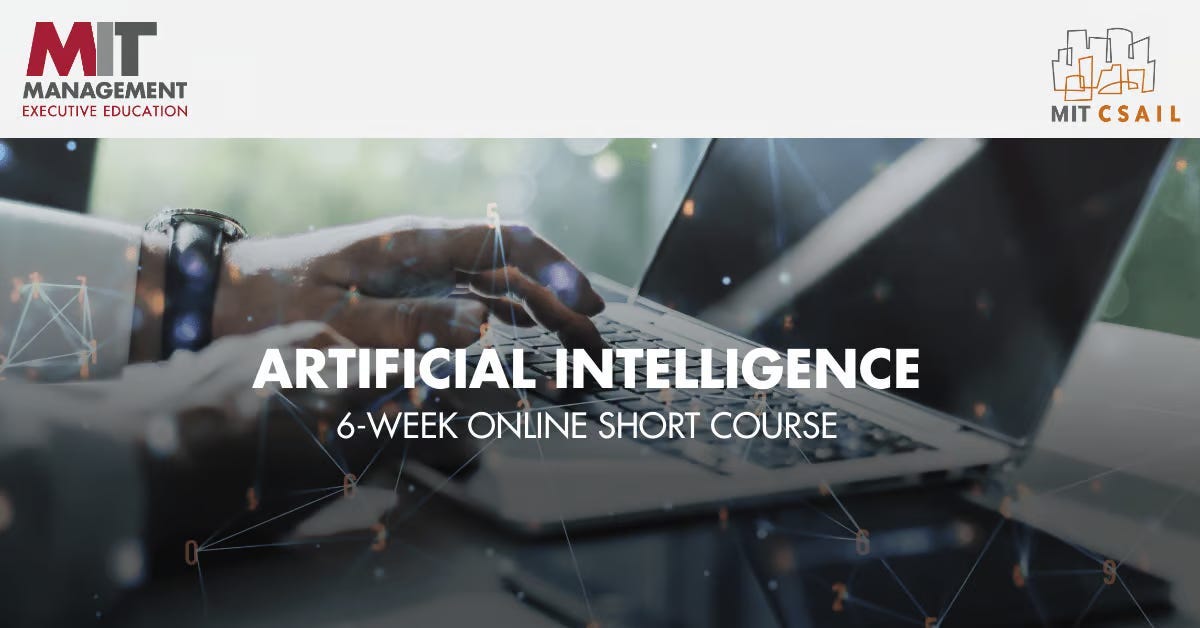Apple bets on giant user base to win in AI
OpenAI leaders address staff concerns over latest controversies
Apple bets on giant user base to win in AI
Microsoft announces Copilot Plus PCs with built-in AI hardware
OpenAI leaders address staff concerns over latest controversies
Artificial Intelligence online short course from MIT
Study artificial intelligence and gain the knowledge to support its integration into your organization. If you're looking to gain a competitive edge in today's business world, then this artificial intelligence online course may be the perfect option for you.
On completion of the MIT Artificial Intelligence: Implications for Business Strategy online short course, you’ll gain:
Key AI management and leadership insights to support informed, strategic decision making.
A practical grounding in AI and its business applications, helping you to transform your organization into a future-forward business.
A road map for the strategic implementation of AI technologies in a business context.
***
Apple bets on giant user base to win in AI
At next month’s developers conference, Apple Inc. is set to unveil its unique take on artificial intelligence, focusing on practical tools for everyday use rather than flashy, cutting-edge tech. Dubbed Project Greymatter, this initiative will integrate AI into core apps like Safari, Photos, and Notes, enhancing features such as notifications, voice memo transcriptions, photo retouching, and Spotlight searches.
Siri will also get a significant upgrade, offering more natural interactions and advanced capabilities on the Apple Watch. While these features may seem like catch-up compared to rivals, Apple’s massive user base could be its secret weapon.
The company has even partnered with OpenAI to bring advanced chatbot technology to iOS 18. Apple acknowledging its limitations in AI but ensuring it delivers top-tier functionality. The real question is whether playing catch-up will matter when hundreds of millions of Apple devices are ready to support these new features later this year….
Originally by Mark Gurman of Bloomberg
***
Microsoft announces Copilot Plus PCs with built-in AI hardware
Microsoft is making a significant leap in integrating AI into laptops with the introduction of "Copilot Plus PCs," which will feature built-in AI hardware and support for AI functionalities across Windows.
Announced by CEO Satya Nadella, these new laptops will be available from all major partners and will include a standout feature called "Recall," designed to create a searchable "photographic memory" of user activities. Running over 40 AI models within Windows 11, these devices will also enhance Microsoft's AI assistant, Copilot, with the latest OpenAI GPT-4o model.
According to Yusuf Mehdi, the executive overseeing Windows, these laptops will be "58 percent faster" than the MacBook Air with an M3 processor and boast all-day battery life. Microsoft anticipates selling 50 million units under the Copilot Plus PC branding in the next year, marking what they believe is the dawn of a new era for Windows laptops. The first models, powered by Qualcomm processors, will hit the market on June 18th, with Intel and AMD versions to follow….
Originally by Jacob Kastrenakis of The Verge
***
OpenAI leaders address staff concerns over latest controversies
In a recent companywide meeting, Sam Altman addressed the controversies surrounding OpenAI, expressing genuine embarrassment over a policy that linked outgoing employees' equity to non-disparagement agreements. The company has since apologized and confirmed the removal of such wording from its standard exit contracts, releasing most former employees from these agreements.
OpenAI's CTO, Mira Murati, also touched on Scarlett Johansson's allegations that the company's AI voice assistant used a voice strikingly similar to hers after she declined to participate in the project. Murati clarified the hiring process for voice actors, while Altman reiterated that the voice was based on an outside actor and apologized to Johansson for any miscommunication.
Additionally, the company faced internal changes with the resignation of Chief Scientist Ilya Sutskever and researcher Jan Leike, who voiced concerns about OpenAI's dedication to studying AI's long-term risks, leading to the dissolution of their safety team….

